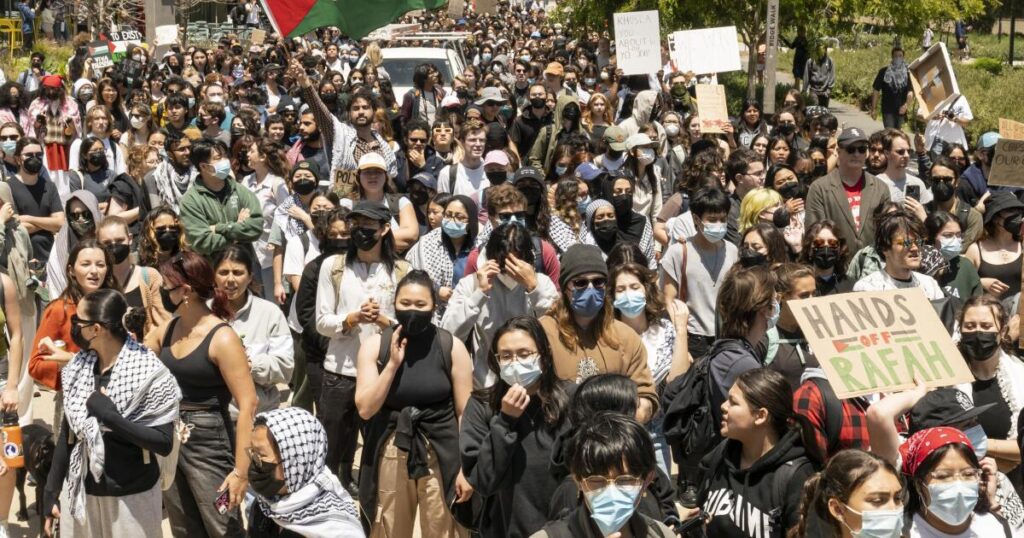Aaron is a professor in the Psychology Department at UC San Diego and lives in North Park, and Ortony is an associate professor in the Chemistry Department at UC San Diego and lives in North County.
We professors, along with over 450 of our colleagues at UC San Diego, condemn the violent removal of a peaceful encampment by authorities on May 6. Recently, we attempted to deliver two petitions (one from the San Diego Faculty Union and one from the Faculty Testimony Group) to the Provost's Office, requesting that the charges and academic consequences against those arrested be dropped. Unfortunately, we were denied access to the Provost's building and received no confirmation of our physical or electronic delivery.
Authorities claimed the encampment was unsafe, but in fact it was the exact opposite: it occupied little-used lawns, did not block pedestrian traffic, and remained completely peaceful in the face of counter-protests for five days.
Students at the camp were eager to do something after watching Israel's seven-month onslaught on Gaza, where most of the planes, helicopters, bombs and artillery shells are American-made and largely funded with U.S. taxpayer funds. In solidarity with students across the nation, our students condemn the enormous loss and destruction of civilian lives, and demand that UC San Diego divest from companies implicated in Israeli abuses and sever academic ties with Israeli institutions.
The encampment took place after university officials had ignored more public protests, such as marches and student government resolutions. Students ultimately joined respected traditions like the encampments set up in opposition to apartheid in South Africa and the Vietnam War. In fact, the recently deceased San Diego legend Bill Walton participated in such an encampment at UCLA in 1972.
We recognize the courage of our students. As Columbia University professor Rashid Khalidi put it:This is the conscience of the nation, [our] The kids.“It wasn't easy for them to keep up with classes, endure threats of punishment from the university and harassment from opponents while speaking their consciences.”
We proudly support the students and share their anger. Moreover, our Jewish tradition connects us to a great tradition of opposition: to stand with the oppressed, not with today's Pharaohs. Indeed, many of the other people who signed these petitions are Jewish. And so are many of the student protesters who, along with thousands of Jews in the United States, including Holocaust survivors and children of Holocaust survivors, are appalled by the indiscriminate collective punishment inflicted on the Palestinian people and the destruction of all institutions of higher education in Gaza. At the same time, we share the pain of the atrocities committed against Israeli civilians and the desperation to free the hostages.
We reject any claims dismissing this encampment as anti-Semitic. We recognize that anti-Semitism is a real form of discrimination that harms our community, and we reject the premise that criticism of the State of Israel and its actions is inherently anti-Semitic. We reject the idea that this encampment was intended to create a hostile environment for Jewish people. We suggest that those who argue otherwise distinguish between “feeling unsafe” (because of statements one does not want to hear) and “being unsafe” (such as encountering the possibility of physical or economic violence).
On May 6, the president put the entire campus on lockdown and deployed hundreds of police officers to confront students with batons, pepper spray, and firearms. Such use of force should only be justified when all other options have been exhausted, but this was not the case here. We saw lines of communication open between university administration and student leaders, campus police and student leaders, and faculty and student leaders. The president justified his actions in part by concerns about the health and safety of the encampment, which could have been resolved. And if force must be used, campus policy already dictates that the level of force be commensurate with the level of civil disobedience. Yet what we saw here was a peaceful encampment. The violent dismantling of this encampment stands in contrast to schools such as Brown University, where the encampment was dissolved after university administration negotiated over its demands.
Our students are the conscience of our nation, acting to stop this US-backed onslaught and end the years of Palestinian land dispossession. The Chancellor must drop the charges and academic repercussions, and negotiate demands as urged by the recent UC labor union strike.



